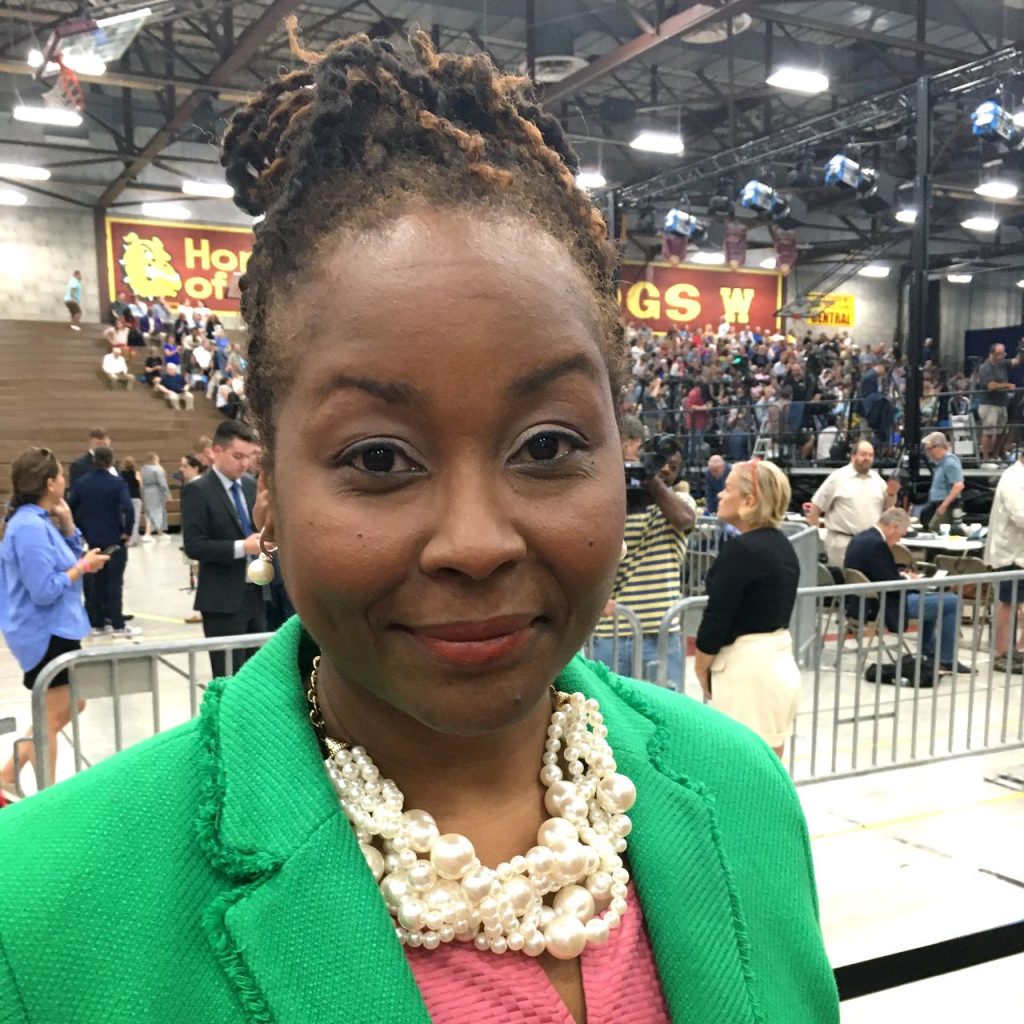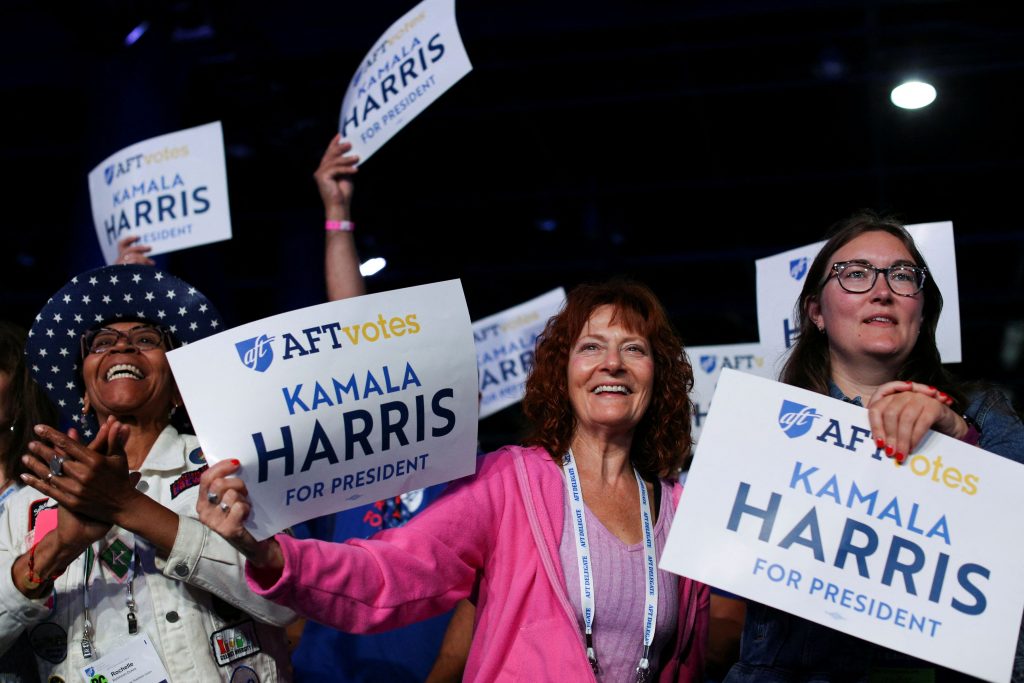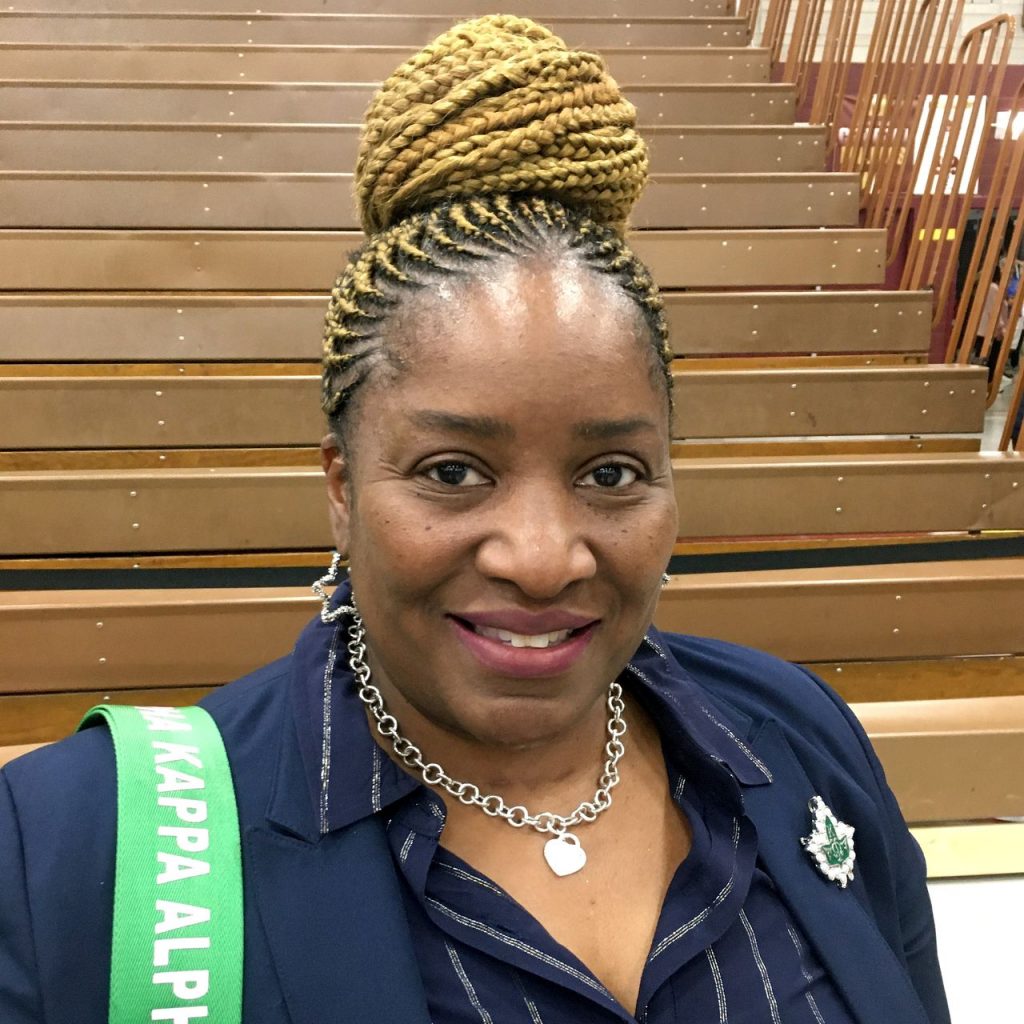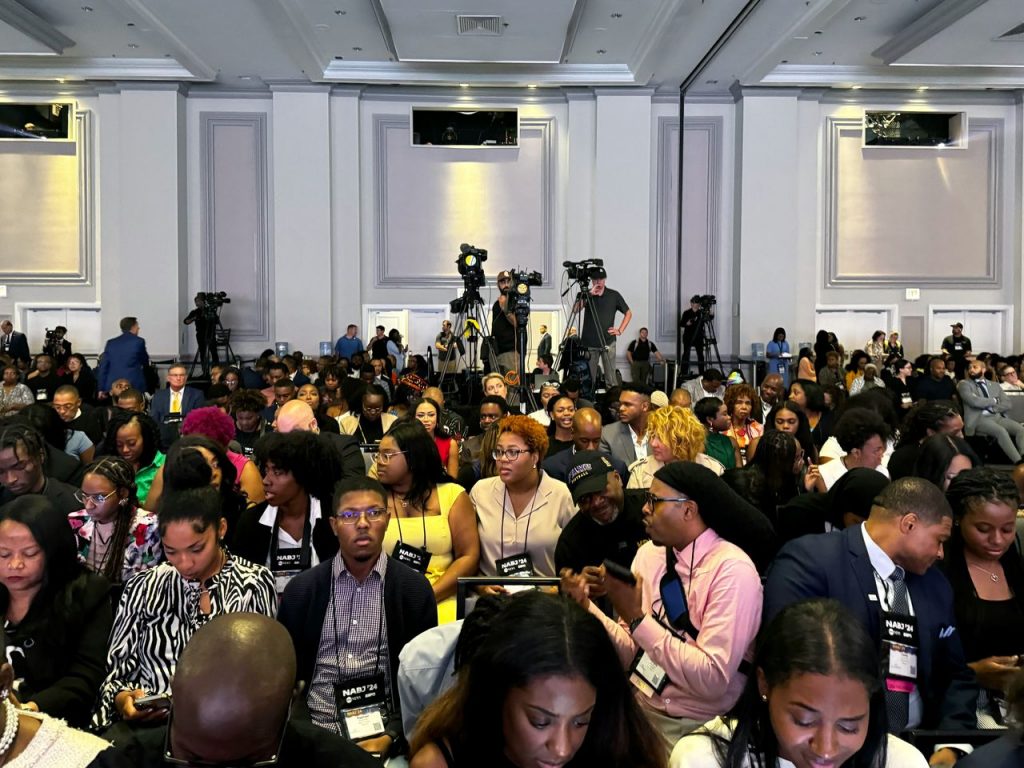Tonnie Boston, a Black woman from Milwaukee, worries America might not be ready to elect a president who looks like her. The excitement she feels for Vice President Kamala Harris , the expected Democratic nominee , reminds her of how she felt when Barack Obama first announced his presidential bid in 2007.
“I have concerns,” said the 50-year-old Democrat and outreach manager for a blood center. “But the country rallied behind Obama, which was a pleasant surprise.” Boston, who attended a recent Harris rally in suburban Milwaukee, hopes the same will happen this time.

Tonnie Boston of Milwaukee PHOTO: JOHN MCCORMICK/WSJ
Harris’s rapid ascension to the top of the Democratic ticket, expected to become official early next month, has thrust race and gender into the center of the contentious 2024 presidential election, in a country where scars of racial segregation and sex-based discrimination still linger.
“For any candidate with a marginalized identity, there’s going to be this question of: can they win over people beyond their community?” said Maya Rupert, a Democratic strategist and a veteran of presidential campaigns. “It’s hard, but it is surmountable.”
A Wall Street Journal poll conducted July 23 to 25, after President Biden bowed out of the race and endorsed Harris, found 81% of respondents said Harris (who is also of South Asian descent) being a Black woman made no difference in whether they would support her for president. They were less likely to say the same regarding whether her race and gender mattered to other Americans, with only half saying those aspects of her identity don’t make a difference to most people.
The poll found the race between Harris and Republican presidential nominee Donald Trump essentially tied, with Trump up 2 percentage points in a head-to-head. Harris leads by 1 percentage point when third-party candidates were included in the survey.
Rupert said many Democrats have good reason to be concerned about white, working-class men in battleground states who might have voted for Biden but not Harris. The “blue wall” states of Wisconsin, Michigan and Pennsylvania are heavy with such voters.
But she said Harris has an opportunity to offset any drop-off in support from white men by adding more women, including white women, to her coalition than Biden might have. She cited Democrats’ midterm success after the 2022 Supreme Court ruling to overturn Roe v. Wade, which established a constitutional right to an abortion.

History suggests that drawing more women will be a challenge . Hillary Clinton , an expected speaker at the Democratic National Convention in Chicago next month, came the closest to becoming the first female president when she was her party’s 2016 nominee before losing to Trump. Among women, Clinton won a slightly smaller share of the female electorate than Obama did in 2012 and 2008. Some women said that electing the first female president wasn’t a reason to back Clinton.
Debbie Walsh, director of the nonpartisan Center for American Women and Politics at Rutgers University, said stereotypes still hold women back from clinching other top posts.
“Voters have become, and frankly parties have become, more comfortable with women in legislative positions—working in committees, working across the aisle,” Walsh said, adding: “Being the place where the buck stops still is new.”
Harris has been acutely aware of how race and gender factor into voters’ thinking throughout her career, people who have worked with her say. She has been criticized by some members of her party in recent years for being an overly cautious politician, but those people said that some of that approach stems from Harris’s belief that she will be held to a different standard as a Black woman.
Harris, whose 2020 presidential campaign ended even before the first nominating contest in Iowa, tried to address the electability question at the time by saying she was a proven winner.
“People are asking, ‘Oh, I don’t know, is America ready for that?’ ‘Are they ready for a woman of color to be elected president of the United States?’ ” she told Iowans at a town hall. “Look, it’s not a new conversation for me. In fact, it’s a conversation that’s come up every single time in every election that I have—and here’s the operative word—won.”
Harris has frequently repeated the advice she got from her late mother, Shyamala Gopalan Harris, when she was growing up. “She’d say, ‘Kamala, you may be the first to do many things, but make sure you are not the last,’ ” Harris has said.
Adrianne Shropshire, head of BlackPAC, a Democratic super political-action committee that does grassroots organizing, said Harris faces a balancing act in her campaign on how much to lean into her lived experience. Black voters in particular might not need to hear all that much from Harris about the boundary-breaking nature of her candidacy to be inspired by it.
“Whether she says it or not, Black people know it. Folks don’t need to be told that this is history in the making,” Shropshire said, adding that outside groups like hers can carry the bulk of that messaging.
The greater spotlight on Harris has made her even more of a target of Republicans, at times in racist and sexist ways. Such attacks on Harris—the first female and first Black vice president—aren’t new, but are becoming louder. Some on the right have called Harris a “DEI hire,” suggesting she has the job because of her race and gender.
House Speaker Mike Johnson (R., La.) and other congressional GOP leaders at a recent closed-door meeting on Capitol Hill urged Republicans to stick to policy critiques.

People hold placards in the audience as U.S. Vice President Kamala Harris delivers the keynote speech at the American Federation of Teachers’ 88th national convention in Houston, Texas, U.S. July 25, 2024. REUTERS/Kaylee Greenlee Beal
Florida Rep. Byron Donalds , one of a handful of Black Republicans in Congress, also spoke briefly at the meeting and said he encouraged colleagues to focus on Harris’s policy record on issues such as border security and inflation.
“I think it’s important for all my colleagues just to be mindful of how they approach this,” he said. “She has a record that’s been a failure for the country, so just stay focused on that.”
Sen. Josh Hawley (R., Mo.) said he agreed, saying he didn’t think Harris was a “DEI hire.”
“No, she’s been a lousy vice president, but on the merits,” he said.
Gail Gray, 47, of Milwaukee, who is a vice principal at a kindergarten through eighth-grade school, said she is confident America is ready for a Black woman as president.
She said the “DEI” put-downs of Harris are “part of the game” in the Trump era. “They say it as a distraction and to discourage people from voting,” she said.

Gail Gray of Milwaukee PHOTO: JOHN MCCORMICK/WSJ
Trump has a long history of derogatory comments against women, particularly those who challenge him politically or otherwise. With his campaign vying for more female and Black voters, he walks a particularly fine line, with Democrats energized by their new candidate. He hasn’t referred to Harris as a DEI hire, but he has called attention to Harris’s brief relationship three decades ago with former San Francisco Mayor Willie Brown, and suggested her political ascent wasn’t based on merit.
Karoline Leavitt, a spokeswoman for the Trump campaign, said race and gender aren’t at play in Trump’s criticisms. “She is weak, dishonest, and dangerously liberal, and that’s why the American people will reject her on Nov. 5th.” undefined undefined LaTanya Evans, a Black woman from suburban Milwaukee, said she plans to vote for Trump because she views Democrats as opposed to her evangelical Christian views. She finds the suggestions that Harris could be a historic figure “insulting” because she thinks she isn’t qualified for the presidency.
“The Democratic Party has not helped Black people,” she said, pointing to what she sees as disincentives to work embedded in the welfare system. “They continue to make it about race and they are being disingenuous about it.”
In the early days of her candidacy, Harris has sought to focus on her decadeslong career —as district attorney in San Francisco, attorney general of California, U.S. senator and vice president.
Harris on the campaign trail this week has contrasted Trump’s legal issues with her experience as a courtroom prosecutor. She said she handled cases involving “predators who abused women,” “fraudsters,” “cheaters” and other criminals.
Several Democrats say that Harris is likely to pick a white man as a running mate to make the ticket more palatable to some Americans, particularly white voters. Her list of top contenders reflects that. They include Arizona Sen. Mark Kelly and Govs. Josh Shapiro of Pennsylvania, Roy Cooper of North Carolina and Andy Beshear of Kentucky.
Rebecca Pearcey, a political strategist who has worked on prior Democratic presidential campaigns, said some voters will naturally question whether an all-female ticket could win if Harris picked a woman as her No. 2. She said it is appropriate to consider whether a white man would be a politically safe choice.
“I think it’s a safe ticket, but it’s also a smart ticket,” Pearcey said, adding: “I don’t think there’s anything wrong with that either. It needs to be a calculation.”
—Vivian Salama, Katy Stech Ferek and Lindsay Wise contributed to this article.
Write to Joshua Jamerson at joshua.jamerson@wsj.com , John McCormick at mccormick.john@wsj.com and Tarini Parti at tarini.parti@wsj.com




